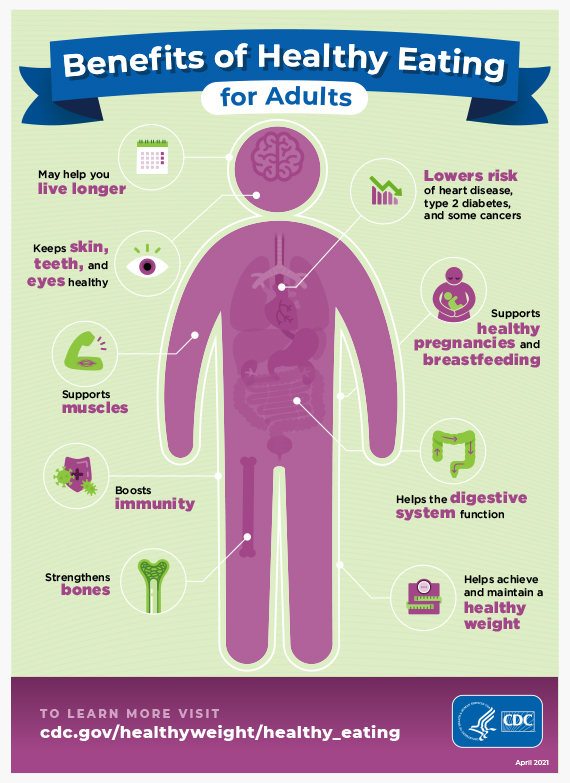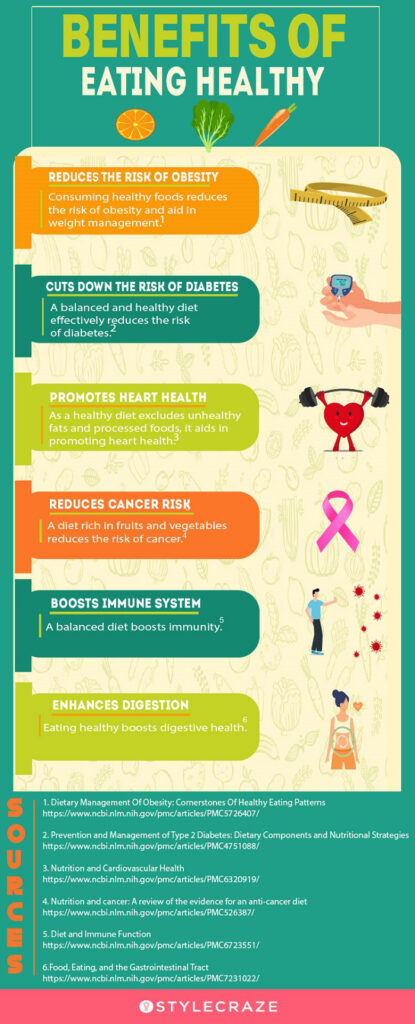I’ve always believed that taking care of my body is the key to living a fulfilling and thriving life. That’s why I’m constantly looking for ways to unlock the benefits of a balanced diet and healthy eating. It’s amazing how the food we consume can impact not just our physical health, but also our mental well-being. From increased energy levels to improved mood and even better sleep, the advantages of nourishing our bodies with the right nutrients are endless. In this article, I will explore the incredible benefits that come with adopting a balanced diet and embracing healthy eating habits, providing practical tips to help you make positive changes in your lifestyle.

Importance of a Balanced Diet
Maintaining a balanced diet is crucial for our overall health and well-being. It provides us with the essential nutrients our bodies need to function properly. A balanced diet consists of adequate amounts of carbohydrates, proteins, fats, vitamins, and minerals. By incorporating a variety of foods into our daily meals, we can unlock numerous benefits that promote optimal health.
Nutritional Needs
Our bodies require a wide range of nutrients to perform various functions. These nutrients, obtained from the foods we eat, are essential for growth, repair, and maintenance of our cells, tissues, and organs. Each nutrient is responsible for specific roles within our bodies, and a deficiency in any of them can lead to significant health problems. By consuming a balanced diet, we can ensure that we meet our nutritional needs and support our overall well-being.
Weight Management
Maintaining a healthy weight is essential for preventing chronic diseases and promoting good health. A balanced diet plays a crucial role in weight management as it provides the right amount of energy our bodies need while keeping our calorie intake in check. By making healthy food choices and avoiding excessive consumption of high-calorie foods, we can achieve and maintain a healthy weight. Incorporating a balance of macronutrients, such as carbohydrates, proteins, and fats, along with portion control, can help us achieve our weight management goals.
Improved Energy Levels
Have you ever felt tired and sluggish after a heavy, unhealthy meal? That’s because the food we eat directly affects our energy levels. A balanced diet provides us with the necessary nutrients that our body converts into energy. Carbohydrates are the primary source of energy, while proteins and fats help sustain our energy levels throughout the day. By consuming a balanced diet, we can ensure that our body has the fuel it needs to keep us energized and active.
Nutrients in a Balanced Diet
A balanced diet consists of a combination of various nutrients that are essential for our body’s proper functioning. These nutrients can be broadly categorized into carbohydrates, proteins, fats, vitamins, and minerals. Let’s explore the role of each of these nutrients and why they are vital for our overall health.
Carbohydrates
Carbohydrates are the body’s primary source of energy, providing us with the fuel to perform daily activities. They are found in foods such as fruits, grains, legumes, and starchy vegetables. Aside from energy, carbohydrates also provide dietary fiber, which is essential for maintaining digestive health. Including a variety of carbohydrates in our diet, such as whole grains and fiber-rich foods, can help us feel fuller for longer and keep our digestive system functioning optimally.
Proteins
Proteins are essential for building and repairing tissues in our body. They are often referred to as the building blocks of life and are found in foods like meat, poultry, fish, dairy products, beans, and legumes. Proteins also play a significant role in the production of enzymes and hormones that regulate various bodily processes. A balanced diet should include adequate amounts of protein to support tissue growth, repair, and overall body function.
Fats
Fats, though often misunderstood, are an essential part of a balanced diet. They provide a concentrated source of energy and are necessary for the absorption of fat-soluble vitamins. Fats also help in insulation and protection of vital organs. However, it is important to consume healthy fats, such as those found in nuts, seeds, avocados, and olive oil, while limiting the intake of saturated and trans fats. Including a moderate amount of healthy fats in our diet can have a positive impact on our overall health.
Vitamins and Minerals
Vitamins and minerals are required in smaller quantities compared to carbohydrates, proteins, and fats, but they are still vital for our body’s proper functioning. These micronutrients play a crucial role in various bodily processes, including immune function, bone health, and cell function. Fruits, vegetables, whole grains, lean proteins, and dairy products are excellent sources of vitamins and minerals. Consuming a variety of foods from these groups ensures that we obtain the necessary vitamins and minerals needed for optimal health.

Role of Carbohydrates
Carbohydrates are a vital nutrient and play multiple roles in our body. Let’s explore their significance in more detail.
Energy Source
Carbohydrates are the primary source of energy for our bodies. When we consume carbohydrates, they are broken down into glucose, which our body then utilizes to fuel essential processes and physical activities. Whether it’s going for a jog or even just thinking, carbohydrates provide the energy needed to carry out these activities efficiently.
Fiber and Digestive Health
Carbohydrates also provide dietary fiber, which is essential for maintaining a healthy digestive system. Fiber adds bulk to our stool, promoting regular bowel movements and preventing constipation. It also helps in keeping our cholesterol levels in check and reducing the risk of certain diseases, such as heart disease and type 2 diabetes. Including sources of dietary fiber, such as whole grains, fruits, and vegetables, can contribute to better digestive health and overall well-being.
Role of Proteins
Proteins are often recognized for their role in muscle development, but their significance goes beyond that. Let’s explore the various roles proteins play in our bodies.
Building and Repairing Tissues
Proteins are responsible for the growth, repair, and maintenance of tissues in our body. They are the building blocks of our muscles, bones, skin, and other organs. Consuming adequate amounts of protein through sources like lean meats, poultry, fish, dairy, beans, and legumes ensures that our body has the necessary resources to rebuild and repair tissues as needed.
Enzymes and Hormones
Proteins also play a significant role in the production of enzymes and hormones that regulate various bodily processes. Enzymes are responsible for speeding up chemical reactions in the body, while hormones act as messengers, communicating between cells and organs. Without proteins, our bodies would struggle to carry out essential functions, such as digestion, metabolism, and hormone regulation.

Role of Fats
Fats often get a bad reputation, but they are necessary for our bodies to function properly. Let’s explore the significance of fats in more detail.
Energy Storage
Fats serve as an efficient energy storage system. When we consume more calories than our body needs for immediate energy, these excess calories are converted into fat and stored for later use. This energy reserve helps sustain us during periods of fasting or when our calorie intake is reduced. It is important to maintain a healthy balance of stored fat to prevent excessive weight gain or loss.
Insulation and Protection
Fats also provide insulation and protection for our bodies. Adipose tissue, which is composed of stored fat, acts as insulation, helping to regulate body temperature. Additionally, it serves as cushioning around vital organs, protecting them from potential injury. Adequate intake of healthy fats, such as omega-3 fatty acids found in fish and nuts, can aid in maintaining optimal insulation and protection for our bodies.
Absorption of Vitamins
Certain vitamins, called fat-soluble vitamins (such as vitamins A, D, E, and K), require fats for proper absorption in our bodies. Fats help transport these vitamins from the digestive system into the bloodstream, where they can be utilized by our cells. Incorporating healthy sources of fats in our diet ensures that we can efficiently absorb these essential vitamins and benefit from their numerous functions in our body.
Importance of Vitamins and Minerals
Vitamins and minerals are often referred to as micronutrients because our bodies require them in smaller quantities compared to macronutrients like carbohydrates, proteins, and fats. However, their importance should not be underestimated. Let’s delve into the critical roles these micronutrients play.
Immune Function
Vitamins and minerals play a vital role in supporting a robust immune system. They help regulate the production and function of immune cells, enabling our bodies to effectively defend against harmful bacteria, viruses, and other pathogens. Adequate intake of vitamins A, C, E, and minerals like zinc and selenium is essential for maintaining a healthy immune system and reducing the risk of infections and illnesses.
Bone Health
Calcium, vitamin D, and other minerals are crucial for maintaining strong and healthy bones. These nutrients contribute to bone density and help prevent conditions like osteoporosis, which is characterized by weakened and brittle bones. Consuming foods rich in calcium, such as dairy products, leafy greens, and fortified cereals, along with adequate sun exposure for vitamin D synthesis, can promote optimal bone health throughout life.
Cell Function
Vitamins and minerals are involved in various cellular processes, ensuring that our cells function optimally. They act as cofactors for enzymes, which are necessary for catalyzing chemical reactions within our cells. These reactions are vital for energy production, DNA replication, and overall cell function. By meeting our daily intake recommendations for vitamins and minerals, we can support proper cell function and maintain overall well-being.

Specific Health Benefits of Healthy Eating
Adopting healthy eating habits and consuming a balanced diet can have numerous specific health benefits. Let’s explore some of them in greater detail.
Reduced Risk of Chronic Diseases
A balanced diet rich in fruits, vegetables, whole grains, lean proteins, and healthy fats is associated with a reduced risk of chronic diseases such as heart disease, type 2 diabetes, and certain types of cancer. The abundance of vitamins, minerals, antioxidants, and fiber found in these foods helps protect our bodies against oxidative stress, inflammation, and other factors that contribute to the development of chronic diseases. By prioritizing healthy eating, we can take proactive steps towards maintaining good health and preventing the onset of these conditions.
Improved Digestion
Consuming a balanced diet, particularly one that includes an adequate amount of dietary fiber, can promote healthy digestion. Fiber adds bulk to our stool, facilitating regular bowel movements and preventing constipation. It also acts as a prebiotic, providing nourishment for the beneficial bacteria in our gut, which play a crucial role in digestion and overall gut health. By incorporating fiber-rich foods into our diet, such as fruits, vegetables, whole grains, and legumes, we can ensure smooth and efficient digestion.
Enhanced Brain Function
The food we eat has a direct impact on our brain health and cognitive function. By consuming a balanced diet, we provide our brains with the necessary nutrients to support optimal brain function. Omega-3 fatty acids found in fatty fish, nuts, and seeds are particularly beneficial for brain health, as they contribute to the structure of brain cells and promote communication between them. Additionally, vitamins and minerals obtained from a variety of fruits, vegetables, and whole grains support various cognitive processes, memory, and focus. Including these brain-boosting foods in our diet can contribute to enhanced brain function and overall mental well-being.
Weight Management and Healthy Eating
Maintaining a healthy weight is important for preventing chronic diseases and promoting overall well-being. Healthy eating is an integral part of weight management, and several factors contribute to this relationship.
Portion Control
One of the key aspects of healthy eating for weight management is portion control. It’s important to be mindful of the quantity of food we consume. By practicing portion control, we can ensure that our calorie intake is in line with our energy needs. This helps prevent overeating and weight gain. It’s helpful to be aware of proper portion sizes and to listen to our body’s hunger and fullness cues to maintain a healthy balance.
Increased Satiety
A balanced diet that includes an adequate amount of dietary fiber, protein, and healthy fats can promote increased satiety. Fiber-rich foods provide bulk, making us feel fuller for longer periods of time. Protein also contributes to prolonged feelings of fullness while promoting muscle growth and repair. Healthy fats, in moderation, add flavor and richness to meals, enhancing satisfaction and reducing the urge to overeat. By incorporating these satiety-promoting elements into our diet, we can better manage our weight and avoid unnecessary snacking.
Boosting Metabolism
Metabolism refers to the body’s ability to convert food into energy. Healthy eating plays a role in supporting a well-functioning metabolism. Foods high in protein require more energy to digest and metabolize, resulting in a slight increase in our metabolic rate. Additionally, certain spices and foods with thermogenic properties, such as chili peppers and green tea, can temporarily boost metabolism. By adopting a balanced diet that includes these metabolism-boosting elements, we can support a healthy metabolic rate and facilitate weight management.

Healthy Eating for Different Life Stages
Healthy eating is important at every stage of life, as our nutritional needs may vary depending on age, physiological changes, and specific requirements. Here’s a glimpse into the significance of healthy eating during different life stages.
Pregnancy and Lactation
During pregnancy and lactation, the nutritional needs of both the mother and the growing fetus are increased. A balanced diet that provides an adequate intake of macronutrients, vitamins, and minerals is crucial to support the growth and development of the baby. Key nutrients during this stage include folate, iron, calcium, omega-3 fatty acids, and protein. A well-balanced diet, along with appropriate prenatal supplementation and guidance from healthcare professionals, ensures optimal health for both mother and baby.
Infancy and Childhood
The early years of life are a critical period for growth and development. Providing a balanced diet during infancy and childhood sets the stage for lifelong health. Breast milk or formula provides essential nutrients for infants, while gradually introducing solid foods diversifies their nutritional intake. It’s important to offer a variety of nutrient-dense foods, such as fruits, vegetables, whole grains, lean proteins, and healthy fats. This helps children develop healthy eating habits, support growth, and prevent nutrient deficiencies.
Adolescence
Adolescence is a time of rapid growth and development, making proper nutrition crucial during this stage. Hormonal changes and increased physical activity significantly impact the nutritional needs of teenagers. Adequate intake of macronutrients, including carbohydrates, proteins, and healthy fats, will support growth, muscle development, and energy levels. A varied diet rich in vitamins, minerals, and fiber will also help establish healthy eating patterns that can carry into adulthood.
Adulthood
During adulthood, maintaining a balanced diet becomes key to supporting overall health and preventing chronic diseases. As our bodies undergo various physiological changes and our lifestyles become more demanding, it’s essential to prioritize nutrient-rich foods and mindful eating habits. Building a diet around whole foods, including a variety of fruits, vegetables, whole grains, lean proteins, and healthy fats, provides our bodies with the necessary nutrients to support optimal health and well-being throughout adulthood.
Older Adults
As we age, our bodies undergo physiological changes that can affect our nutritional needs. Older adults may have decreased appetite, reduced absorption of nutrients, and increased nutrient requirements. It’s important to focus on nutrient-dense foods to meet these changing needs. Adequate intake of protein helps maintain muscle mass and supports overall health. Calcium and vitamin D are crucial for bone health, while adequate fiber intake promotes digestion. Older adults can benefit from incorporating a variety of fruits, vegetables, whole grains, lean proteins, and healthy fats into their diet while considering their individual needs and any specific medical conditions.
Conclusion
In conclusion, a balanced diet plays a vital role in promoting optimal health and well-being. By incorporating a variety of foods that provide the necessary macronutrients, vitamins, and minerals, we can unlock numerous benefits. From supporting our energy levels and maintaining a healthy weight to promoting proper cell function and reducing the risk of chronic diseases, healthy eating is essential at every stage of life. By embracing a balanced diet and making mindful food choices, we can maximize the potential benefits and pave the way for a healthier, happier life.


